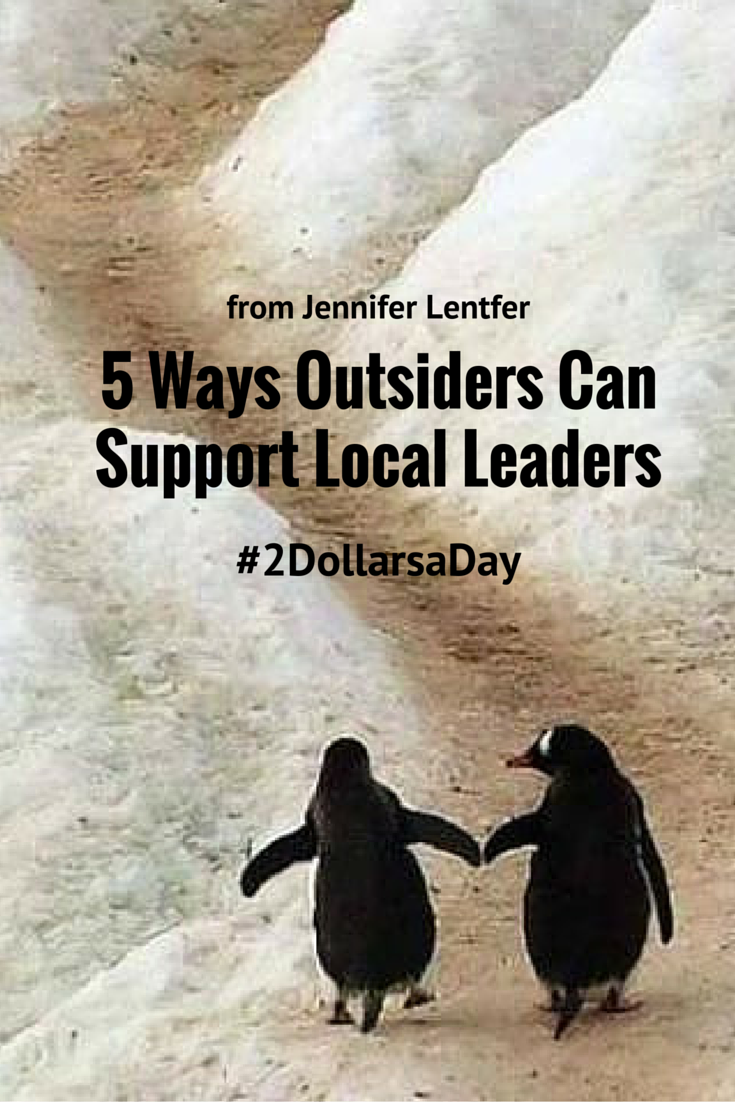5 Ways that Outsiders can Support Local Leaders
By Jennifer Lentfer, IDEX Director of Communications and creator of how-matters.org
I started my career during the height of the AIDS epidemic in sub-Saharan Africa. The vast numbers of “AIDS orphans” had the news media and thus the international aid and philanthropy community in a tizzy at the turn of the century. With parents dying at such rates, leaving so many children behind, how were these countries ever going to have a future?
I lived and worked in southern Africa at the time, working for a large US-based international NGO. What is undeniable to me in this time was that most children were getting by not because of sweeping national-level policies or major internationally-funded programs.
Rather, I learned that those who survive and thrive do so because of the efforts of people who organize their communities to extend support and services. The 300+ grassroots organizations I’ve worked with were linked to local churches, schools, or clinics. They were made up of neighbors, and friends, and extended families who were, by and large, organized around one purpose—to fill the gap for children and families not being helped otherwise.
A missing piece of the do-gooder puzzle
Conservative estimates say that there may well be over one million local organizations and grassroots movements operating across the globe. The web of these initiatives, working on a wide variety of issues, is still largely undocumented and unrecognized around the world.
The biggest thing that well-intentioned do-gooders in the rich countries must recognize is that in most places around the world, people are already organized and doing something about whatever problem they are concerned about. There is a formal and informal non-profit sector kicking in most places, though often ignored, under the radar, and/or under-resourced.
As those of us in rich countries get behind local leaders and their efforts, we have an opportunity for lasting social change that even the most comprehensive and impactful white-in-shining-armor efforts may never be able to accomplish. This is what the Two Dollar Challenge is all about.
Are you a local leader?
If people from your community are knocking on your door for help and you are working day and night to help fulfill their needs, then yes, you are a local leader.
If you are coming up with the ideas and steps forward, based on a process where you generated solutions to the problems you share with your neighbors’ and fellow community members, then yes, you are a local leader.
If you are implementing a project and it’s not just a job or a hobby, it is a matter of life and death, as well as personal obligation to people you face every day, go ahead, you are a local leader.
If you can identify with the people you’re serving to such an extent that you feel an duty to be directly accountable to them in a personal rather than an abstract way, then you are a local leader.
Essentially, unless you’re on the ground, doing the work with and on behalf of your own community on a daily basis, you’re not a local leader.
That makes most of us…local leader supporters.

The skills and qualities you need
Who can support effective local leaders who are at the forefront of change? It’s those whose eyes, ears, and voice are devoted to working with people in the Global South to find solutions to their own problems. It’s those with a professional, but more importantly, a personal resolve to nurture alternative models of “development” that genuinely build on the knowledge, skills, dignity, culture, abilities, and resources of local people.
The role of “local leader supporter” is also a great responsibility, privilege and burden. Concrete and sophisticated skills are required to pull it off well. Here are five ways that we as outsiders can embody, cultivate, and celebrate our role in supporting local leaders:
-
You are a loudspeaker.
There is no such thing as being a “voice for the voiceless.” Everyone has a voice. But not everyone is listening.
You are there to listen to local leaders first, and then to advocate for their interests, ensuring that they receive the resources they’ve identified as necessary for change to happen.
A loudspeaker is someone who will fight for what local leaders need to succeed. When it comes to addressing the underlying causes of suffering, oppression, and injustice, they know what is needed at the community level better than anyone.
-
Be an expert, but not in the way you think.
Many people focus on becoming an “expert” in a technical area such as child survival or agriculture, or becoming an expert in an organization’s policies, procedures, and guidelines. These skills can be useful, but what about becoming an expert on the local champions with which you work?
What happens when you deeply understand the skills, resources, knowledge, and capacities that local leaders bring to the table?
“Local expertise” does not receive the recognition and support it deserves. So instead of bringing in your outside expertise, be students of local leaders, learning from, with, and by members of the community and grassroots groups.
-
Help people take a step back.
At all times, local leaders can be supported to think creatively about their work and to identify and overcome obstacles. Outsiders can offer ideas and recommendations, but these are limited by what we don’t or can’t know.
Therefore, our more important role is to encourage, coach and uphold processes of individual and collective reflection. Supporting local leaders to look at problems from a new perspective, and encourage openness, will build people’s confidence and give birth to true innovation.
-
Like it or not, you are a leader.
Leaders translate good intentions into good practice, and in realm of international assistance, every success depends on it.
An effective supporter of local leaders also lives by his or her values, shares vision and inspiration, exhibits personal responsibility, and personifies integrity.
-
But be a friend first.
A true friend celebrates your successes and shares your failures. From my own experience and failures, the most important thing I’ve learned is that respect, positivity, and unending encouragement enables the trust that results in authentic and productive friendships between us and local leaders. Warmth and caring reminds people of their essential humanity, enabling them to see the possibilities before them.
Despite all of the challenges that local leaders face working in a low-resource setting, you will encounter unparalleled commitment and dedication. Perhaps more importantly in my journey, I have seen the power of vision, love, and persistence.
What all of us have to understand about our job, first and foremost, is that most effective local leaders do what they do out of a sense of caring and mutual responsibility. And they will carry on, whether we are there or not.
 Jennifer Lentfer is a Nebraska farm girl turned international aid worker. Given that her hometown of Bruning, Nebraska, USA has a population of just 248 people, it’s no wonder Jennifer Lentfer found her true calling in accompanying small, local organizations to be strong forces for social change.
Jennifer Lentfer is a Nebraska farm girl turned international aid worker. Given that her hometown of Bruning, Nebraska, USA has a population of just 248 people, it’s no wonder Jennifer Lentfer found her true calling in accompanying small, local organizations to be strong forces for social change.
Jennifer is constantly looking for ways to portray the realities of people’s lives, their struggles, their strengths – as well as outsiders’ roles and mistakes – in an impatient, “silver bullet solutions” world. She writes about on her blog how-matters.org and as the Director of Communications for IDEX – International Development Exchange. She was named as one of Foreign Policy Magazine’s “100 women to follow on Twitter” at @intldogooder.

 Previous Post
Previous Post Next Post
Next Post